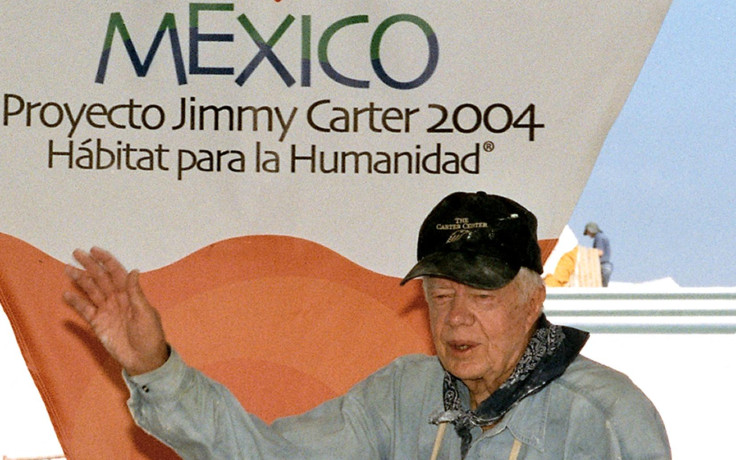
Former President James Earl "Jimmy" Carter Jr., who died today, December 29, 2024, at the age of 100 in his home in Plains, Georgia, led a life marked by a deep commitment to human rights, international diplomacy, and humanitarian service, with significant ties to Latin America.
Born on October 1, 1924, in Plains, Georgia, Carter grew up in a family dedicated to peanut farming. His parents, James Earl Carter Sr. and Bessie Lillian Gordy, instilled in him values of hard work and religious faith. In 1946, he graduated from the United States Naval Academy in Annapolis, Maryland, and that same year he married Rosalynn Smith, his partner for over seven decades. They had four children: John William (Jack), James Earl III (Chip), Donnel Jeffrey (Jeff), and Amy Lynn.
Jimmy Carter's Political Career
After serving seven years as a naval officer, Carter returned to Plains to take over the family peanut business following his father's death. His political career began in 1962, when he was elected to the Georgia State Senate. He later served as Governor of Georgia from 1971 to 1975, gaining recognition for his progressive civil rights policies and focus on modernizing the state.
@facethenation FACE THE NATION'S 70TH ANNIVERSARY: In 1976, the two men who would eventually become the Democratic and Republican presidential nominees each joined Face The Nation in separate appearances. In March, then-Governor Jimmy Carter faced questions about voters' perceptions of him. In June, President Gerald Ford discussed his chances against Ronald Reagan at the convention. #politics #history #historytok #jimmycarter
♬ original sound - Face The Nation
In 1976, Carter won the U.S. presidency as a Democratic Party candidate, presenting himself as a political outsider during a time of public distrust following the Watergate scandal. His term (1977-1981) emphasized human rights and international diplomacy.
Among his most notable achievements were the 1978 Camp David Accords, which facilitated peace between Egypt and Israel, and the 1977 Torrijos-Carter Treaties, which returned control of the Panama Canal to Panama, strengthening Latin American sovereignty.

Carter's Relationship with Latin America and Latinos
During his presidency, Carter showed genuine interest in strengthening ties with Latin America and promoting social justice.
In addition to the Torrijos-Carter Treaties, his administration condemned human rights violations in Latin American dictatorships, promoting democracy in the region. His commitment to human rights resonated positively within the U.S. Latino community, who saw him as an ally in the fight for equity and justice.
After leaving the White House, Carter and his wife founded The Carter Center in 1982, a non-governmental organization dedicated to human rights advocacy, conflict mediation, and election monitoring.
The Center has monitored more than 100 elections in 39 countries, including several in Latin America, ensuring fair and transparent processes. Recently, Carter's team condemned the role of the Maduro regime in Venezuela's July 2024 elections, declaring them invalid.
Carter was also an active supporter of Habitat for Humanity, helping build homes for communities in need. His commitment to this cause spanned more than three decades, reflecting his dedication to public service and improving living conditions for the disadvantaged.
Nobel Peace Prize and Lasting Legacy
In 2002, Carter received the Nobel Peace Prize in recognition of his efforts to find peaceful solutions to international conflicts, advance democracy and human rights, and promote economic and social development.
His legacy endures through democratic institutions and ongoing struggles for human rights worldwide. The Latino community, in particular, remembers Carter as a leader who promoted social justice and strengthened inter-American relations, leaving an indelible mark on contemporary history.
@couriernewsroom President Jimmy Carter became the first former president to turn 100 years old.
♬ original sound - COURIER
© 2025 Latin Times. All rights reserved. Do not reproduce without permission.




